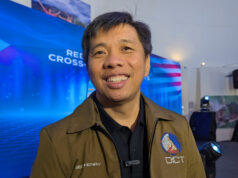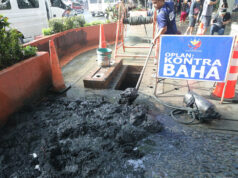Marcos warns vs militarization of South China Sea, alludes to China

PRESIDENT Ferdinand R. Marcos, Jr. on Wednesday raised an alarm against the militarization of the South China Sea and alluded to “coercive activities” of China’s coast guard and militia vessels.
“We share concerns on the militarization of reclaimed features, the dangerous use of coast guard and maritime militia vessels and other coercive activities,” he told a meeting with South Korea at the Association of Southeast Asian Nations (ASEAN) Summit in Jakarta, without mentioning China.
“We are equally alarmed by illegal, unreported and unregulated fishing which are being detected,” he added.
He thanked Korea, Japan and the United States for reiterating the importance of international law in maintaining stability in the Indo-Pacific region during the meetings recently held in Camp David.
He made special mention of Korea for its “continued support in upholding the UNCLOS (United Nations Convention on the Law of the Sea) as a key pillar of the rules-based international order as the region faces unilateral attempts to change the status quo in its waters.”
China seems to be building a runway on an island in the South China Sea that is also claimed by Vietnam, the South China Morning Post newspaper reported last month, citing satellite images.
The images showed an airstrip stretching across Triton Island in the Paracels, which both Hanoi and Taipei claim as theirs, the newspaper said. The runway is much shorter than others China has built on contested islands, limiting the size of the warplanes that can use it, according to the paper.
The Chinese Coast Guard and militia vessels on Aug. 5 fired water cannons to block a Philippine attempt to deliver food and other supplies to a grounded ship at Second Thomas Shoal.
The Philippine Coast Guard and Armed Forces of the Philippines accused China of using “dangerous maneuvers” and putting the lives of Filipinos at risk.
In the meeting, Mr. Marcos expressed grave concern over the recent surge of intercontinental ballistic missile launches by North Korea. “We underscore the need for [North Korea] to fully comply with all UN Security Council resolutions,” he said.
“We also affirm our support for the principles embodied in [South Korea’s] audacious initiative that aims to achieve a denuclearized DPRK (Democratic People’s Republic of Korea), an essential component for sustainable peace and prosperity in the Korean Peninsula, in Northeast Asia and the world,” he added.
Mr. Marcos is set to meet with South Korean President Yoon Suk Yeol on Sept. 7 before returning to Manila.
On Tuesday, Mr. Marcos said ASEAN “must never allow the international peaceful order to be subjected to the forces of might.”
He also urged his fellow Southeast Asian leaders to support the “operationalization of practical measures… for maritime interaction.”
‘DISTANT REALITY’
The Philippine leader during a session at the ASEAN Summit called out nations that peddle “misleading narratives” on the South China Sea.
He said tensions in the South China Sea are not just due to the worsening conflict between the US and China, a view that he said undermines the Philippines’ legitimate claims.
“The Philippines firmly rejects misleading narratives that frame the disputes in the South China Sea solely through the lens of strategic competition between two powerful countries,” Mr. Marcos said. “This not only denies us of our independence and our agency, but it also disregards our own legitimate interests.”
Mr. Marcos said all parties should exercise self-restraint in activities that complicate disputes in the South China Sea. “We must not undermine regional peace, stability and security.”
“We cannot emphasize enough that actions, not words, should be the ultimate measure of our commitment to securing peace and stability in the South China Sea,” he said. “Anything else simply does not suffice.”
Security in Southeast Asia and the whole Indo-Pacific region has been a major discussion among ASEAN countries, as they deal with increasing tensions between the US and China.
The US and its Asian and European allies have vowed to make the Indo-Pacific region “free and open” amid what they describe as authoritarian threats.
The US and its allies are worried about China’s assertiveness in the South China Sea, which is believed to contain massive oil and gas deposits and through which billions of dollars of trade passes each year.
China claims the South China Sea almost in its entirety based on a 1940s map that a United Nations-backed tribunal said in 2016 was illegal.
China recently released a 2023 version of its standard map, featuring a 10-dash line. The Philippines, Vietnam, India and Taiwan have criticized the map.
Mr. Marcos said ASEAN’s vision for the South China Sea as “a sea of peace, stability and prosperity” remained “a distant reality.”
Meanwhile, Canadian Prime Minister Justin Trudeau has invited Mr. Marcos to visit Canada next year, Malacañang said hours after a bilateral meeting between the two leaders in Jakarta.
Mr. Trudeau extended the invitation so that Mr. Marcos could celebrate the Philippines and Canada’s 75 years of diplomatic relations there, it said in a statement.
Canada is among the countries that have supported the Philippines in its sea dispute with China. — Norman P. Aquino and Kyle Aristophere T. Atienza



